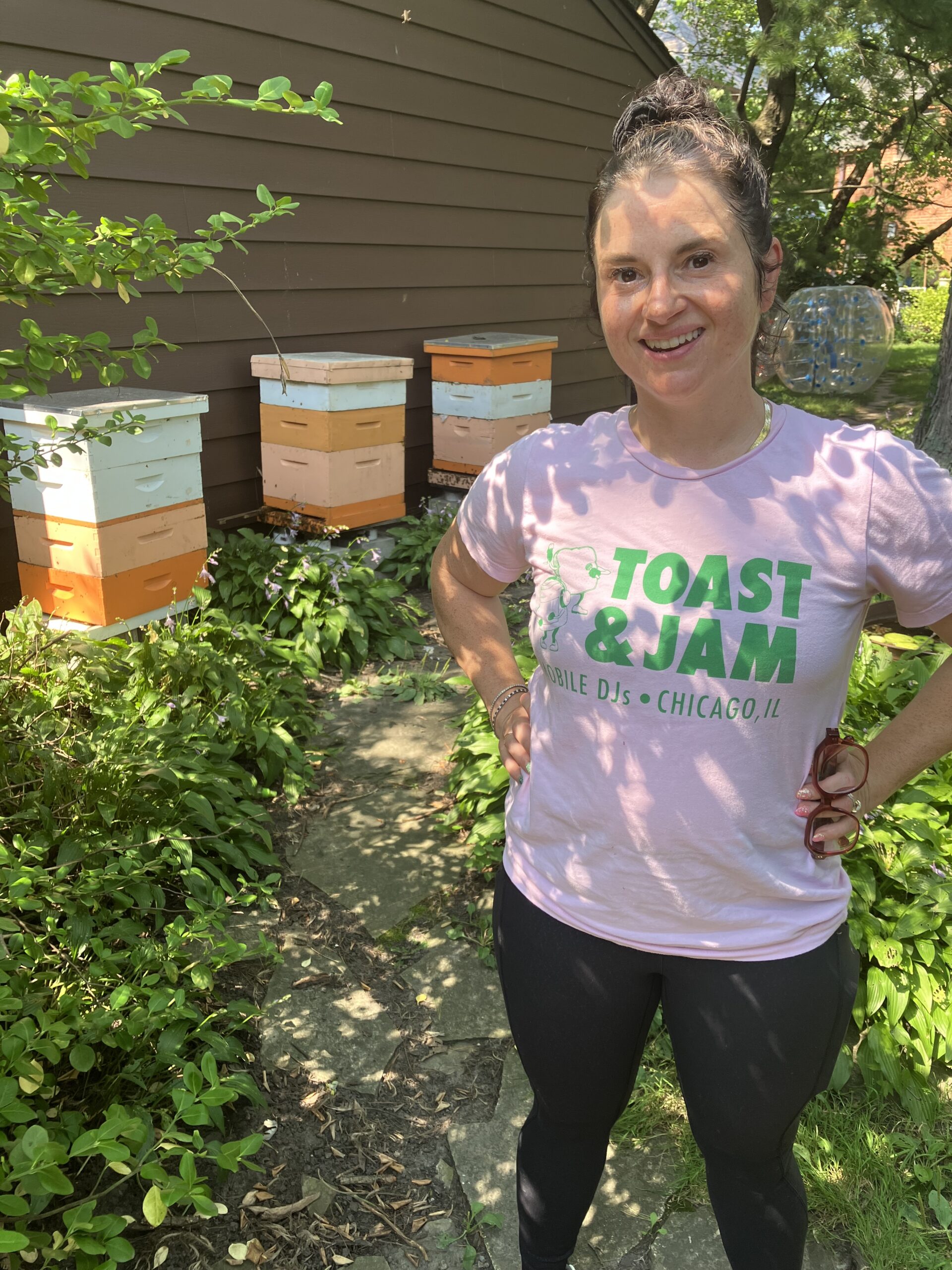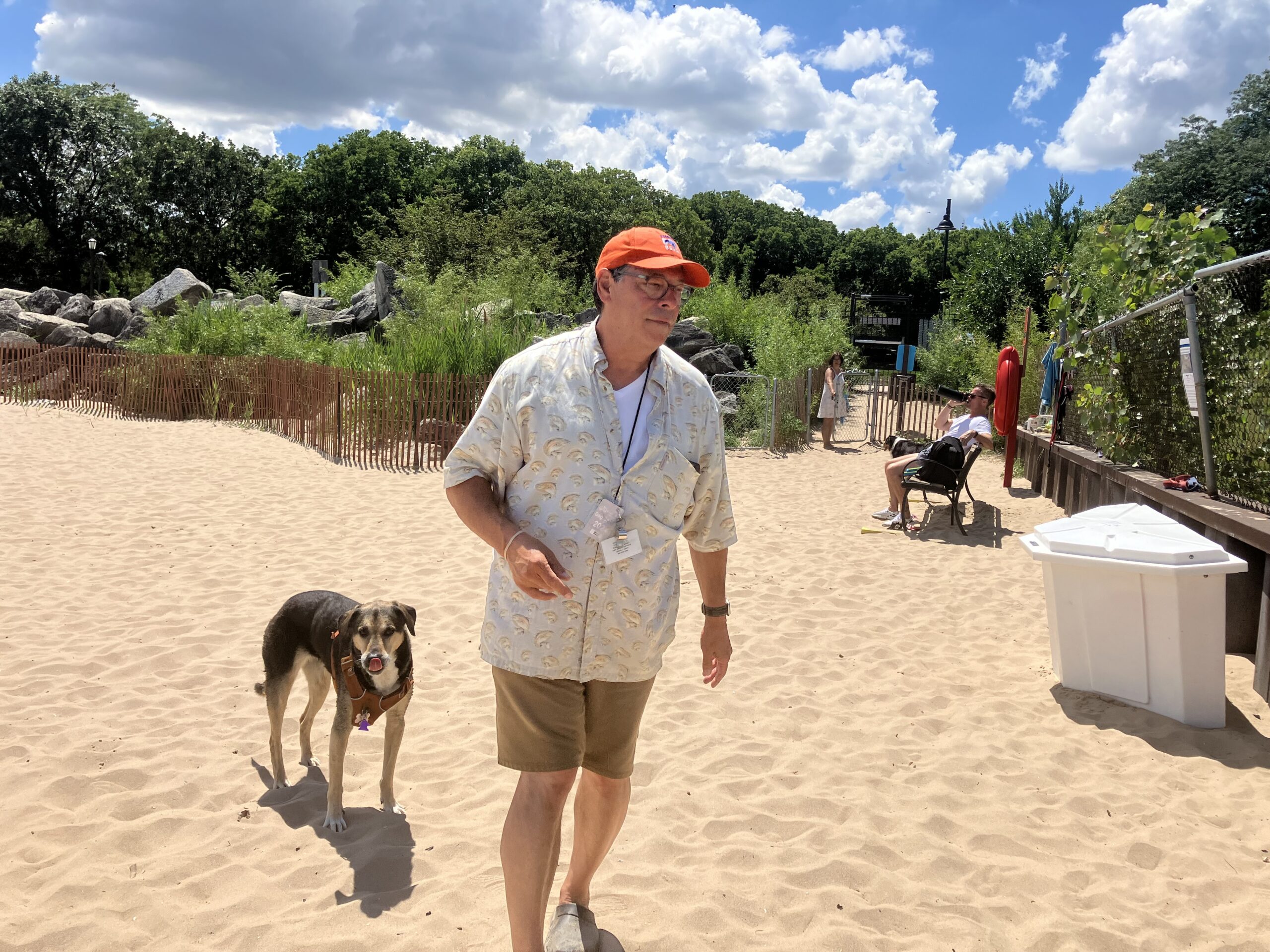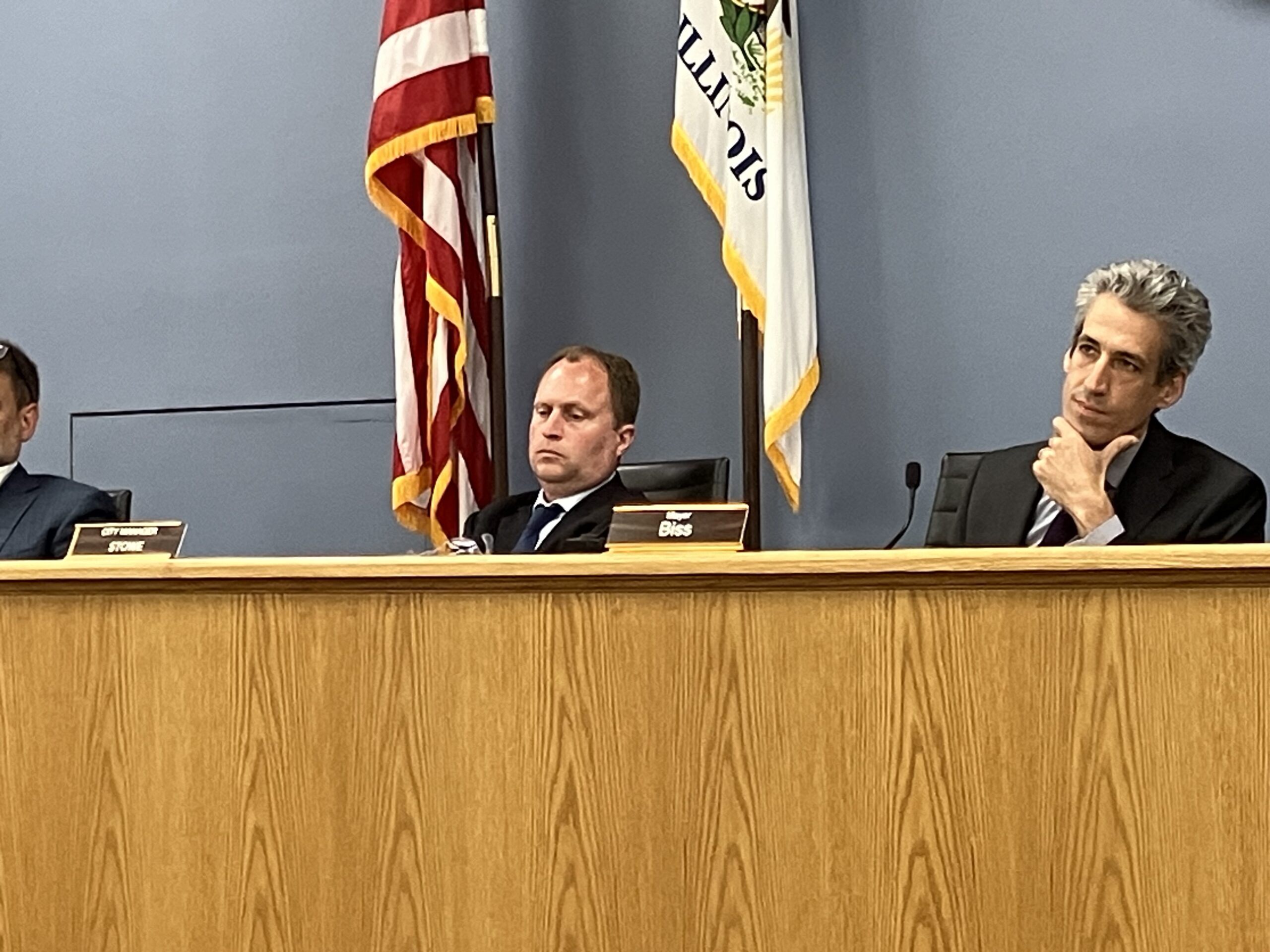By Bob Seidenberg
Northwest Evanston resident Nina Paleologos said she has barely used her yard or pool – which sit on the other side of a garage and hedges from her neighbor’s beehives – during the second half of summer.
“When I do, I am unable to relax and am in a constant state of hypervigilance,” she said. “Family and friends are afraid to come over.”
Paleologos brought her concerns to the city’s Human Services Committee’s Aug. 21 meeting.
She has lodged an objection against the city’s issuance of a license to keep beehives to neighbor Mary Nisi, who lives one door to the east of her on the 3000 block of Grant Street.
“The mission of the Health and Human Services Department is to protect, preserve and promote wellness for people, not for bees,” she said in a statement to the committee. “Having these hives next door is unsafe and presents a danger.”
Nisi maintained she has been a responsible beekeeper and taken all the steps prescribed under city ordinance to respond to neighbors’ concerns, including “requeening” the hive.
She is not even certain the stinging and divebombing that Paleologos and others say they have experienced is coming from her hive, or from bees, for that matter.
“In the beekeeping community, folks were talking about how the yellow jackets were out in full force this year,” she said. “There are about 15 hives currently in Evanston, and bees have a three-mile traveling radius. There is no way to know where anyone’s bees come from in nature.”
Stories from neighbors
At the Aug. 21 meeting, Paleologos, a physician and director of neurology for Advocate Health Care’s Midwest region, told committee members that “for over a year neighbors have been traumatized almost daily by bees from Ms. Nisi’s hives while in my backyard, particularly when in and near the pool.
Nina Paleologos: “The mission of the Health and Human Services Department is to protect, preserve and promote wellness for people, not for bees.” Credit: Bob Seidenberg screenshot
“Extraordinarily aggressive, without provocation, they repeatedly attacked, divebombing,” she read.
“They chase us, get caught up in our hair and our clothing, attacking heads, faces. … We cannot even run into the house, as they would enter with us. One friend hurt her foot trying to get away.
“Multiple people have been stung,” she continued. “A neighbor across the alley was stung,” prompting that person to call 311. “My sister was stung in her eyelid while sitting quietly in the hot tub. If stung in the actual eye, she could have lost sight or her eyeball. Others have been stung over the head, the hand, etc.”

Paleologos also called attention to a video she provided the committee, showing Nisi being attacked in a similar way.
In a statement and comments to the committee, Nisi, who runs Toast & Jam, a popular DJ service, said she has been a beekeeper for seven years and has registered her hives with the state.
She previously had kept bees in her backyard in Logan Square in Chicago, which does not require a license, she said.
“Never had anyone complained about the hives. In fact, I am usually thanked for them,” she said.
She moved to her Grant Street home in the middle of 2022, bringing her hives with her.
She learned in mid-June that she needed a license, “so up until that time, in Evanston, at least, I have kept them [the bees] without anyone even noticing,” she told committee members. “So I don’t know about this era of terror that’s been being waged,” she said, referring to neighbors’ comments.
Licensing a beekeeper
The city’s licensing process requires a beekeeper who proposes to bring a colony into Evanston to submit proof of written notice to all adjacent property owners, said Ike Ogbo, the city’s health and human services director, in a memo to the committee.
On July 6, after finding Nisi met all city standards, the department issued her a license to operate an apiary at 3040 Grant St.
Four days later, however, the department received a complaint from an adjacent neighbor regarding the beekeeper’s inability to properly manage the bee colony, Ogbo reported. He said adjacent property owners sent several other complaints such as bees swarming and divebombing and attacking neighbors.
Each complaint resulted in inspections by licensed environmental health practitioners within the department, who were unable to find any issues during inspections, he said.
Ogbo also noted in his memo to the committee that “the beekeeper has amassed seven years of experience in beekeeping and has employed strategies to inhibit any aggressive behaviors of the queen.”
“One of her strategies was requeening the hives as quickly as possible, as the ordinance stipulates, in order to counter any unusually aggressive behaviors. The beekeeper has also invested in two ultrasonic bee-repelling devices to deter the bees from the neighbors’ property.”
Requeening and other steps
Nisi told committee members that her hive swarmed on May 30, something she described as typical.
“When a hive swarms, the queen goes and mates with a new bunch of suitors, and sometimes you can get bad genetics,” she told the committee.
“Three weeks after that, I did wind up having some defensive behavior – not aggressive – and at the same time that Nina [Paleologos, her neighbor] was also having issues with people with this divebombing,” she said.
“And all the research that I have seen, that behavior is for wasps and hornets and yellow jackets, not bees, and I don’t tag my bees so I don’t know if they were my bees.
“But I definitely took it [neighbors’ complaints] seriously,” she told committee members. “I responded to her quickly with all of her things [concerns raised]. I wound up requeening all of my hives, splitting them into two different hives; and once I did that there was no longer any of that behavior. I did buy some ultrasonic bee-repellent things that I gave to her and I haven’t heard from her, and that was almost a month.”
Ann Pantoga, an attorney for Paleologos, took issue with some points in Nisi’s story.
She said her client first noticed the bees last year. At the time she did not know they were coming from Nisi’s backyard.
With respect to the written proof of notice to neighbors of bringing a bee colony into Evanston, Pantoga said the form her client was asked to sign just acknowledged she had been informed that Nisi had the hive and gave her client 30 days to object.
“I’d like to point out Ms. Nisi kept beehives for maybe over a year or a long period of time without notifying neighbors and without seeking a license,” Pantoga told committee members. “That does not seem to be the actions of a responsible beekeeper.”
Video a point of contention
Nisi’s five beehives were brought to the city’s attention by a different neighbor. Further, Pantoga pointed out, “Nisi did not have a water supply for a number of months, causing the bees to congregate in Dr. Paleologos’ backyard pool.”
Paleologos also submitted a list of beekeeping sites, which recommended greater distances for hives from peoples’ homes.
“While it is aggravating to have stinging insects drinking from your own pool, it is even worse to have them inundating your neighbor’s pool,” advised one.
Pantoga also brought up Instagram videos Nisi had made regarding her beekeeping. “One video in particular shows the aggressive nature of the bees,” she said. “It shows a bee in her hair. She had to stop the video. She was crouching five seconds.”
Nisi told committee members that the video was one she created on Instagram and meant to be funny.
It was taken after she captured a swarm and the bees were going to be cranky, she said. “It wasn’t like I was terrified for my life. I didn’t think my personal life was going to be brought in here like this,” she told the committee.
“I understand that bees get a bad rap, mostly for being conflated with wasps, hornets and yellow jackets,” she said in her email to Ogbo, after being informed there would be a hearing on her license. “But we literally need bees to survive as a species. I am following all the guidelines and doing a good job caring for these bees.”
Committee to go outside for help
This objection was the first one to an apiary since the city’s beekeeping ordinance was amended to include a notice requirement that was adopted in July 2016.
In discussion, Fifth Ward Council Member Bobby Burns asked staff whether an independent expert was available to “help evaluate these decisions or help kind of evaluate these complaints in the future.”
Council Member Eleanor Revelle (7th Ward) said she also felt “it would be helpful for us to have some kind of professional input at this point.”
Revelle expressed hope an outside expert would be able to evaluate key points, such as the recommended distance of a hive from a neighbor’s property.
Committee members voted unanimously to table the issue until their October meeting, with the expectation that in the meantime the city bring an outside expert to evaluate the situation.
Before the vote, Revelle asked Paleologos whether she had seen improvement since her neighbor had made changes, resetting the hive and providing the ultrasonic bee- repelling devices.
Paleologos said the devices are approved only for outdoors and are not to be plugged in near a known hive because that could stir up the bees.
Overall, she noted that the steps her neighbor took were done at the end of July and it’s too early to say whether they have made a difference.
She told Revelle, “I certainly don’t go out in the morning on a Sunday to do the New York Times crossword puzzle with my cup of coffee and sit by the chaise, because they’re really close to where the hives are – less than 20 feet.
“I’ve lived here since 1990, and I have never had an issue or problem with any of my neighbors, nor have I complained about them,” she said after the meeting.
“It’s a safety issue,” she said. “But it’s also kept me from relaxing and enjoying my backyard and pool. It’s really changed the way I use my yard and pool dramatically.”




